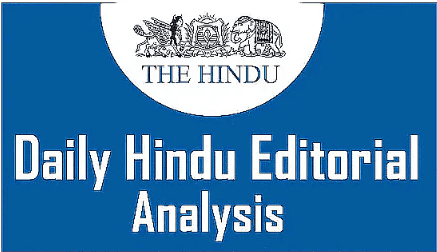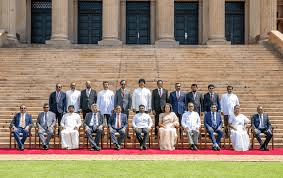UPSC Exam > UPSC Notes > Current Affairs & Hindu Analysis: Daily, Weekly & Monthly > The Hindu Editorial Analysis- 21st November 2024
The Hindu Editorial Analysis- 21st November 2024 | Current Affairs & Hindu Analysis: Daily, Weekly & Monthly - UPSC PDF Download

An Overturning of Sri Lanka’s Old Political Order
Why in News?
The National People’s Power (NPP), led by Sri Lanka’s President Anura Kumara Dissanayake, has swept the Sri Lankan parliamentary polls with an astounding majority. The NPP’s success, built on Mr. Dissanayake’s win in September 2024 (the presidential election), was made possible by an astute reading of the ground sentiment, patient planning and execution of a smart election strategy. There is another side to this story: Sri Lanka is Asia’s oldest electoral democracy, with universal suffrage going back to 1931, and its citizenry, in an awesome political swing, have not only given the new government an overwhelming mandate but also clearly rejected the political status quo.
- In 2024, India faced major challenges with its Neighbourhood First Policy.
- The election of Anura Kumara Dissanayake in Sri Lanka represented a shift from traditional politics, making it harder for India and Sri Lanka to maintain good relations.
- In Pakistan, the rise in cross-border terrorism continued to put pressure on the relationship between India and Pakistan.
- The return of K P Oli to power in Nepal raised worries about a decline in diplomatic ties with India.
- In Bangladesh, protests against Sheikh Hasina's government led her to seek support in India, raising fears about India's role in the situation.
- Additionally, there was ongoing instability in the Northeast of India and the rise of radical groups, contributing to a difficult environment for India's foreign relations.

About National People’s Power (NPP)
- National People’s Power (NPP), also known as Jathika Jana Balawegaya (JJB), is a political alliance in Sri Lanka that follows socialist principles.
- The alliance was established in 2019 by Anura Kumara Dissanayake, who is a member of the Janatha Vimukthi Peramuna (JVP).
- The NPP gained significant attention when Dissanayake was elected as president in 2024, securing 42.31% of the preferential votes.
- The NPP receives most of its support from the Sinhalese majority community in Sri Lanka.
- The JVP has shifted its focus from its past of violence to engaging in politics in a more peaceful manner.
- Historically, the JVP was involved in two major uprisings in 1971 and 1987 and had strong anti-India views similar to many nationalist groups in the area.
- Currently, the JVP is working to improve its image by participating in the political process without resorting to violence.
Significance of NPP Coming to Power
- Change in Political Landscape: In the 2020 parliamentary elections, the National People’s Power (NPP) aimed to surpass the ruling Sri Lanka Podujana Peramuna (SLPP) and gain a majority in parliament. However, the SLPP achieved a significant victory, while the Samagi Jana Balawegaya became the main opposition party. The NPP only secured 3 seats, remaining in third place.
- Reasons for Sudden Shift: During the COVID-19 pandemic, Sri Lanka encountered many difficulties, especially in the tourism sector. To help, India and the IMF provided loan support, but the IMF placed conditions that required Sri Lanka to raise taxes, make business processes easier, and move away from its free economic policies. The strict rules from the IMF during the national unity government led by Gotabaya Rajapaksa created a tough situation for the NPP. Anura Kumara Dissanayake successfully connected with the public’s discontent regarding these policies, which was crucial for his success. His government was formed out of public anger towards corruption and economic mismanagement.
- Economic Worries: Dissanayake’s government might cause instability in the Sri Lankan economy as he has suggested renegotiating the terms of the International Monetary Fund (IMF) support. This could make relations with international financial organizations more complicated. His administration has also threatened to cancel important projects, such as the solar power project by India’s Adani Group and the large Colombo port project backed by the US International Development Finance Corporation. These actions could endanger India’s investments in the region, which are crucial for both economic and geopolitical interests.
Impact of Dissanayake’s Arrival on India-Sri Lanka Relations
- The Modi government is under scrutiny for relying too much on the administration of Sheikh Hasina in Bangladesh.
- This focus often leaves out other political groups, such as the Bangladesh Nationalist Party and the anti-Indian Jamaat-e-Islami.
- Such a narrow approach to diplomacy can have effects on India’s broader strategy in the region, especially with neighboring countries like Sri Lanka.
- The election of Anura Kumara Dissanayake and his party, the National People’s Power (NPP), brings a new situation to Sri Lanka’s politics.
- These changes could lead to both positive and negative effects on the relationship between India and Sri Lanka.
Positive Aspects
- Acknowledgment of India’s Role: Dissanayake has openly acknowledged the importance of India for Sri Lanka’s safety and economic stability. His government’s willingness to keep conversations going with India suggests a chance for better cooperation between the two countries.
- Economic Interdependence: With significant Indian investments in Sri Lanka, such as infrastructure projects and support during tough economic times, Dissanayake’s government is likely to focus on continuing these partnerships to help stabilize the economy. This economic link may serve as a protective factor against political instability.
- Balanced Foreign Policy: Dissanayake is expected to adopt a balanced stance in international relations, steering clear of a strong alignment with China. This approach would be advantageous for India, which aims to maintain its influence in the area as China's presence grows.
- Potential for Reform: With a new mandate, the National People’s Power (NPP) may introduce fresh policy ideas that align well with India’s development objectives, particularly in sectors where India has a significant interest.
Negative Aspects
- Populism and Economic Risks: Dissanayake’s policies, which are popular with voters, might threaten Sri Lanka’s economic recovery. If his government decides to implement extreme economic changes or renegotiate current agreements, it could endanger important projects that involve Indian investments.
- Domestic Political Pressure: The National People’s Power (NPP) party may face pressure from nationalist feelings and past issues with India. To satisfy local critics, they might take a more careful or aggressive approach toward India, which could harm their relationship.
- Increased Influence of Radical Elements: The NPP’s partnership with leftist ideas might unintentionally strengthen radical groups in Sri Lanka that have traditionally held negative views towards India. This could lead to more public anger against India, making diplomatic relations more difficult.
Conclusion
- India needs to understand that its connections with neighboring countries are linked, not separate.
- A detailed neighborhood strategy is important, which should consider the special traits and needs of each country.
- This strategy should also focus on regional economic integration.
- India should recognize:
- Assets: This includes chances for working together in trade, infrastructure, and technology.
- Liabilities: These are problems like past conflicts, nationalism, and outside influences.
- By using its position as a key driver of growth, India can become an important player in regional transport and communication networks.
- India can also lead joint efforts to address urgent issues such as climate change.
The document The Hindu Editorial Analysis- 21st November 2024 | Current Affairs & Hindu Analysis: Daily, Weekly & Monthly - UPSC is a part of the UPSC Course Current Affairs & Hindu Analysis: Daily, Weekly & Monthly.
All you need of UPSC at this link: UPSC
|
38 videos|5288 docs|1117 tests
|
Related Searches





















